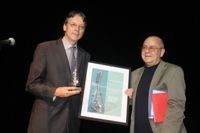The UNESCO Regional Office for Culture in Latin America and the Caribbean in Havana awarded with the Fernando Ortiz International Prize

- El Sr. van Hooff sostiene el premio y el diploma acreditativo junto al Dr. Barnet
- © UNESCO La Habana
The Regional Office for Culture in Latin America and the Caribbean in Havana is awarded with the Fernando Ortiz International Prize, the highest prize awarded by the Foundation that bears the name of the outstanding Cuban anthropologist to national and foreign personalities and institutions for their contribution to the study and development of the Cuban, Latin American and universal cultural identity.
When reading the reasons for awarding the prize during the ceremony, Dr. Miguel Barnet, President of the Fernando Ortiz Foundation, underlined that the prize was awarded on this occasion to the Regional Office of UNESCO in Havana as an acknowledgement “to the valuable work implemented in the fields of cultural diversity, conservation of World Heritage as well as education, science and information”.
During the ceremony, Barnet also acknowledged as merits of the institution “the formulation of working programmes, cultural projects and the implementation of specific cooperation mechanisms in favor of the countries of the Latin American and Caribbean region”, particularly “the permanent support in the implementation of the UNESCO international project “the Slave Route” which among other projects, protects and safeguards the indigenous cultural and spiritual values of our peoples”.
- More
- Message from UNESCO Director-General (in Spanish)
- Source:UNESCO La Havane/Portal de la Cultura América Latina y el Caribe
- 17-01-2011

